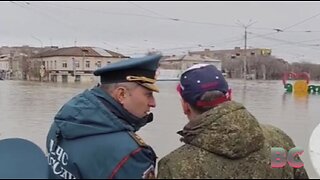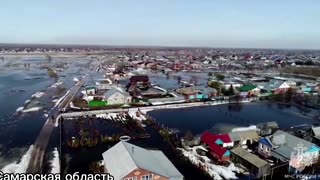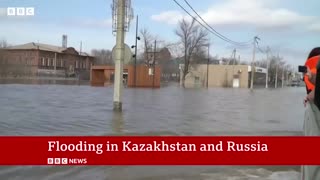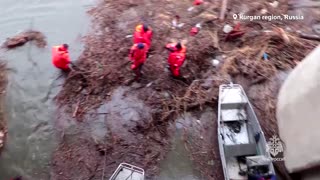Russia NOW! Unprecedented Floods: 36 Regions Affected! Urgent Evacuations, Dam Breaches and Chaos
As of April 6, 36 regions in the Russian Federation have been affected by severe floods. After a sudden warming, snowmelt accelerated, causing water levels in the rivers of the Orenburg region to rise rapidly. In the city of Orsk, the threat of a dam breach at the Irkutsk reservoir led to an increase in water discharge. Regional authorities declared a state of emergency, noting that such a level of discharge "had never been seen in the history" of the reservoir. However, even these measures were not sufficient.
On April 5, the Ural River breached a dam in the Old Town of Orsk, leading to severe flooding. More than 2,500 houses were submerged, prompting an urgent evacuation. Over 4,200 people have already been evacuated from flood zones.
The water level near the breached dam in Orsk reached 31.5 feet, exceeding the design capacity of 18 feet. The flood peak in the region has not yet passed, and water continues to rise.
Massive floods have also occurred in Siberia, affecting the Novosibirsk, Kemerovo, Tomsk regions, and the Altai Territory. Here, the climate spring arrived almost two weeks earlier than usual.
In the Altai Territory, a state of emergency was declared at the end of March. Due to high water levels, some road sections were closed, and hundreds of houses were flooded.
In the Novosibirsk region, water levels rose so high that it reached the waist of an adult. In the Chelyabinsk region, a bridge was washed away by water streams, cutting off the only crossing for residents. Rescue services are currently delivering food and medicine by water.
According to the Ministry of Emergency Situations, floods in the Samara region have been the strongest in 35 years.
In Khimki, Moscow region, the water level has risen so much that residents have resorted to inflatable boats. Eyewitnesses say such flooding has never been seen in the area before. Utility services are pumping out water using industrial pumps.
A combination of factors has led to the complex flooding situation in Russia. Many regions experienced an abnormal amount of snowfall over the winter. Record-breaking temperatures in early spring led to rapid snowmelt across the country. Heavy rains have exacerbated the situation, increasing the scale and damage of the natural disaster.
The simultaneity, anomaly, quantity, and strength of these climate disasters in recent years are striking. This sets them apart significantly from the catastrophes that occurred on the planet just 10 years ago.
To learn more about why the Earth's climate and geodynamics have changed so much in recent years and what will happen to our planet in the next five years, join the "Global Crisis. The Responsibility" forum.
-
 0:51
0:51
Reuters
2 months agoRecord floods in Russia force thousands to evacuate
1.21K1 -
 0:40
0:40
Reuters
2 months agoFloods in Russia's Urals force thousands to evacuate
1.6K1 -
 1:15
1:15
B.C. Begley
2 months agoRussian dam bursts forcing thousands to evacuate in flood-hit southern region
65 -
 0:39
0:39
Reuters
2 months agoRescuers help evacuate people from flooding in Russia's Urals
2.22K -
 2:11
2:11
Reuters
2 months agoFlooding spreads in Russia, thousands told to evacuate
659 -
 5:00
5:00
Press News Trending
1 month agoRussia and Kazakhstan hit with 'worst floods in decades' | BBC News
46 -
 1:10
1:10
Reuters
1 month agoSevere floods continue to inundate parts of Russia
5211 -
 0:29
0:29
DANIVASI
2 months agoFlooding In Orsk, Russia
2 -
 1:09
1:09
Reuters
1 month agoExtreme flooding swamps Russia's Orenburg region
7432 -
 0:40
0:40
RT
2 months agoEmergency workers rescue dogs from flooded region after levee burst in Russia
4.3K6